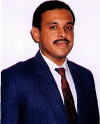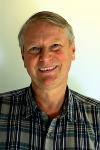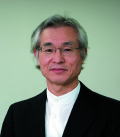
Since 2009.1.5
|
Keynote Speeches
- Oct. 20(Tue.) Morning : Plenary talk by Prof. Udaya Parampalli
- (University of Melbourne, Australia).

- Title :
- Low Correlation Zone Sequences over finite fields and rings
-
- Abstract :
- Low correlation zone (LCZ) sequences were introduced to address a specific
requirement of a generalized quasi-synchronous code-division multiple access
(QS-CDMA) communication system. In this talk I will introduce the problem
of low correlation zone sequence design and present basic schemes using
Interleaving techniques. The low correlation zone requirement presents
new challenges in the area of bounds involving family size and low correlation
parameters. I will talk about some of the results on limitations arises
from the bounds. There have been several papers dealing with the construction
methods involving finite fields, finite rings and several combinatorial
objects such as Hadamard matrices. The talk will include key constructions
and a brief survey some recent results in the area.
-
- Oct. 21(Wed.) Morning : Plenary talk by Prof. Tor Helleseth
- (University of Bergen, Norway).

- Title :
- Cross-correlation of m-sequences, exponential sums and Dickson polynomials
-
- Abstract :
-
Let
s(t) and s(dt) be two binary m-sequences of the same period
2m-1 where gcd(d,2m-1)=1. The cross-correlation between
these two m-sequences is defined to be
Cd (τ) = Σt (-1)s(t+τ)
- s(t)
where the
summation is over a full period t=0,1,..,2m-2, The main problem is
to find the distribution of the cross-correlation i.e. the values that occur
and their multiplicity when τ ranges through 0,1,..,2m-2. The cross- correlation between m-sequences is a well studied problem
during the last 40 years. A survey over known results as well as an overview
of some interesting remaining open problems is presented.
In
particular new recent results are presented for the cross-correlation of
sequences with decimations on the form d = (2k+1)/(2r+1)
using connections to Dickson polynomials and calculations of some special exponential
sums.
- Oct. 22(Thu.) Morning : Plenary talk by Prof. Fumiyuki Adachi
- (Tohoku University, Japan).

- Title :
- Wireless Challenge
-
- Abstract :
- Broadband wireless technology which allows higher-than-1Gbps data transmission with extremely low transmit power may be necessary in future wireless communication systems. The wireless channel for such broadband transmissions is severely frequency-selective. Frequency-domain wireless signal processing may play an important role in achieving a good signal transmission performance. The multi-carrier (MC) multi-access technique, including OFDMA and MC-CDMA, has been gaining popularity. Meanwhile, it has been shown that the use of frequency-domain equalization (FDE) based on minimum mean square error (MMSE) criterion improves the transmission performance of single-carrier (SC) multi-access, including DS-CDMA. This suggests that either SC- or MC-based multi-access technique with FDE can be used. Unfortunately, the available wireless bandwidth is limited while a higher-than-1Gbps transmission is demanded. Particular attention has been paid to multi-input/multi-output (MIMO) multiplexing (SDM) to significantly increase the throughput without expanding the signal bandwidth. Besides the broadband wireless signal processing, another practically important issue exists, which is a significant reduction of transmit power. Applying wireless multi-hop technique or distributed antenna technique is a possible solution to this issue. In this talk, we will overview the state-of-the-art broadband wireless technology.
-
-
|
IWSDA09 is supported by
IEICE(Japan),
IEEE(USA),
IEEE(Fukuoka, Japan),
SITA(Japan)
and
NSFC(China)
Last Update 2009.1.5

|

